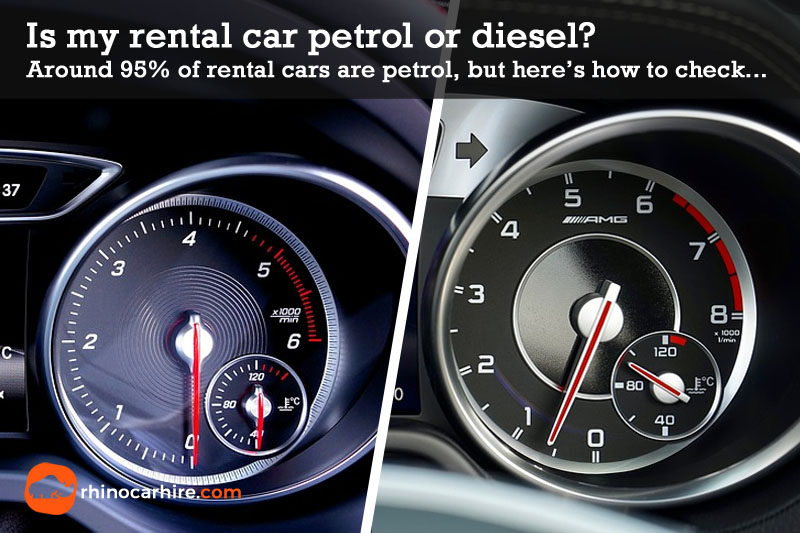We’re car enthusiast here at Rhino so telling the difference between a petrol car and a diesel car won’t cause us any sleepless nights, however we appreciate that not all of our customers might find it so easy. So we’ve put together a few hints and tips to help you determine whether your rental car is a petrol or diesel to help you make sure you don’t
mis-fuel your rental car when it comes to refilling the tank.

First of all, it’s worth noting that the majority of rental cars all over the world are petrol models, we estimate that only around 1 in 20 rental cars supplied are diesel models. Petrol cars are generally cheaper to buy and maintain than their diesel equivalents for the rental agents and whilst may not deliver the same MPG as a diesel, as it’s you that is paying for the fuel, this is of little concern to the rental agent. Unless you specifically want a diesel rental car, the chances are you will be supplied with a petrol model. That’s the general rule of thumb, however certain vehicle types don’t conform, for instance, if you’re renting a 4x4 it’s likely that it could well be a diesel engine. Most pick-up’s and many 4x4’s only come in diesel variants so another indication of what fuel type your rental car might be.
1. Engine Noise
You should notice the first time you start the engine whether the car is diesel or petrol. A modern petrol engine in the vast majority of rental cars will be very quiet on start up and when revving, with exception of some our more exotic cars like the Mustang rentals in the USA which typically have a V6 or V8 engine. A diesel engine by comparison will sound much louder and have an obvious ‘chug’, often referred to sounding like a tractor. Most commercial vehicles (buses / lorries) have diesel engines so you should recognise the sound. If you can’t hear the engine from inside the car, wind the window down, a light rev of the throttle (not in gear) should make this clear.
2. Rev Counter
If the engine sound isn’t conclusive, the dashboard should offer a few more clues. Diesel engines typically rev a lot lower than a petrol equivalent, so the tachometer (rev-counter) next to the speedometer is your next port of call. A diesel engine will typically have numbers from 1-6, on the counter with the red section usually starts around 4-5 (the numbers represent 1,000 engine revolutions per minute – ‘RPM’). A petrol car however will have higher numbers and sometimes show up to 8 or 9k RPM with the red zone starting around 6-7k RPM.
3. Badge
We operate a ‘
or similar car rental’ policy, meaning we can’t guarantee the exact make and model of car you’ll receive, however most manufacturers identify their models with a series of names / numbers / letters. If you see a ‘D’ in this model number (you’ll usually see a model badge on the boot lid), it’s usually a diesel. For instance, a BMW 320d would be a diesel variant, whereas the petrol equivalent would be a 320i. Similarly, a volvo might carry the D4 variant for diesel and T5 variant for petrol (T indicating a turbo petrol). Have a look on the boot lid for a model derivative as it could answer your question. All modern diesel engines are turbo charged and many manufacturers carry the 'TDi' badge, another sign that your rental car is diesel.
4. Filler Cap
If you’re still unsure, the filler cap should always have a label to advise the required fuel for your specific car.
New EU fuel labelling came into force in October 2018 to simplify this in Europe, however fuel labelling on the inside of the fuel filler cap is common among all vehicle manufacturers so this should be your last resort to confirm the fuel type. Another helpful tip, let us show you
which side the fuel filler cap is on.